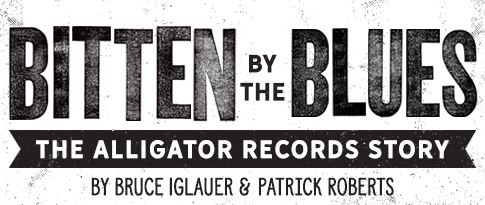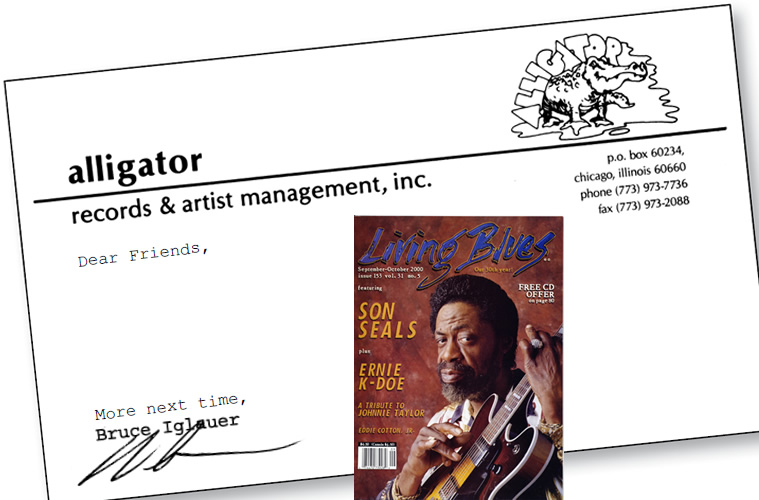Dear Friends,
I hope that, as you read this, you’re enjoying some of our latest releases, like That’s My Partner! by Elvin Bishop and Little Smokey Smothers, or Wicked by Shemekia Copeland, or The Chill by Rusty Zinn. If you’d like to find out more about these albums, you can check out our new, much-improved web site at www.alligator.com. It may look almost the same, but it has lots more information, it’s easier to move around on, and our on-line store is now internet secure. Plus, it contains up-to-the-minute tour dates on Alligator and Black Top artists.
I’m also thrilled to announce that we’ve just signed my friend Marcia Ball! I’ve watched her grow from being a fine Texas/Louisiana pianist and singer into one of thefinest blues and R&B artists in the country. She’s not only an instant party-starter, but she can chill you with a swamp pop ballad in the way that very few can. We hope to have a new album in the first part of 2001.
I have no new studio adventures to report this month, so I’ll return to 1984, when Dick Shurman and I were producing Johnny Winter’s Alligator debut, Guitar Slinger. Last time, as you’ll recall, I had left Red Label studios with the master tapes under my arm, furious at the studio owner and determined to find a new place to work. Leaving Johnny fuming in a suburban hotel room, I went from studio to studio trying to find an engineer who could reproduce the sounds that Freddie Breitberg was getting at Red Label.
After a frustrating series of failed attempts, I ended up at the door of Streeterville Studios. I had left there with Freddie a couple years before, and there was no love lost between myself and the management of the studio. But business is business, so the owner suggested I try out a new, young engineer named Justin Niebank and see how I liked their new Studio B. Justin was a clean-cut suburban kid in his early 20s who admitted that he knew almost nothing about the blues. But he sat and listened to Freddie’s cassette of rough mixes, and then put the 24-track tapes on the machine and proceeded to reproduce the sounds in about an hour! I was shocked at the quality of his work; his mixes were bright and open and punchy, plus they had something that I learned to called “transparency.” That’s when you can close your eyes and see the whole band laid out in front of you, and really tell what each musician is playing and where it’s coming from. That evening with Justin was the beginning of a beautiful marriage that lasted for about five years.
Meanwhile, Johnny was getting kind of homicidal by this time, and Dick wasn’t too happy with me either. I assured them that everything was going to be ok now, moved Johnny to a downtown hotel near the studio, and brought them in to begin the overdubs. Johnny was used to doing a lot of his solos over a few times, until he felt they were just right. Plus, he liked to re-sing (and sometimes rewrite) songs in the studio. So we settled in for a few nights of guitar and vocals, plus some horn section overdubs. The first night, Johnny (probably trying to get some revenge for days of being cooped up in a hotel room) got pretty drunk. He was doing guitar overdubs, and nothing was happening quite right. Then, in between some drunken muttering that sounded suspiciously like “I’m gonna kill somebody” (meaning me), he whipped off an absolutely brilliant solo on “Lights Out,” the ridiculously fast Dr. John-composed New Orleans rocker. It was the only thing that we kept from that night, but that solo alone was well worth the evening. Johnny didn’t actually kill me (whew!), but it was one of the more psychologically “interesting” nights I’ve spent in the studio—and a baptism by fire for Justin. Johnny went on to pull off some more surprises, some of which I’ll tell you about next time.
Bruce Iglauer

